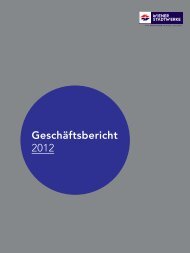Wiener Stadtwerke Annual Report 2012
You also want an ePaper? Increase the reach of your titles
YUMPU automatically turns print PDFs into web optimized ePapers that Google loves.
10. Research and development<br />
The <strong>Wiener</strong> <strong>Stadtwerke</strong> Group invests in research, technology<br />
and innovation (in German: FTI) in order to be able to master<br />
future challenges. To this end, the Group prepared its own FTI<br />
strategy in 2011: A key element here is the ability to better<br />
manage complex innovation issues which affect the entire<br />
<strong>Wiener</strong> <strong>Stadtwerke</strong> Group.<br />
The FTI strategy is seen as the key to actively developing<br />
innovative and future-oriented business areas, to creating a<br />
commercial environmental geared to the future and to making<br />
it possible to launch advanced technologies and services.<br />
Furthermore, the FTI strategy aims to support the Group in<br />
achieving its commercial targets, to help identify future<br />
opportunities and also ensures that the <strong>Wiener</strong> <strong>Stadtwerke</strong> is<br />
always up-to-date with regard to the technologies and<br />
processes that it uses. In order to better integrate its FTI<br />
activities, a research coordinator has been appointed and,<br />
from <strong>2012</strong>, a Group-internal FTI fund has also been<br />
established.<br />
Besides the coordination and content-specific work associated<br />
with research projects, another important milestone in <strong>2012</strong><br />
was the signing of a cooperation agreement between <strong>Wiener</strong><br />
<strong>Stadtwerke</strong> and the Vienna University of Technology. The<br />
purpose of the cooperation between the Group and the VUT is<br />
to advance the necessary transformation process in the areas<br />
of mobility and energy systems so as to be able to jointly<br />
design and pursue inter-disciplinary projects. The first strategic<br />
project involves designing a joint doctoral programme on<br />
the issue of smart cities. This will take place during 2013. In the<br />
winter semester 2013/14, up to ten doctoral students will work<br />
on inter-disciplinary theses roughly covering the fields 'energy<br />
systems of the future' and 'new mobility'.<br />
The issue of integrated mobility is an important research focus<br />
for <strong>Wiener</strong> <strong>Stadtwerke</strong>. It was for this reason that the Group<br />
submitted the Vienna Model Region project 'eMobility on<br />
demand' as the consortium leader of numerous Group-internal<br />
and external partners in the hope of securing financing from<br />
the Klima- und Energiefond (Climate and Energy Fund). Having<br />
received funding support, this project has now been ongoing<br />
since <strong>2012</strong>.<br />
The e-mobility on demand (eMoD) project aims to facilitate<br />
the use of e-vehicles and establish charging stations at those<br />
interfaces<br />
• where they can replace commercial traffic which previously<br />
relied on burning fossil fuels,<br />
• where they guarantee mobility in every transport situation<br />
in which walking, bike and public transport use will still not<br />
be a viable alternative for citizens,<br />
• and where e-vehicles, as part of an optimally integrated,<br />
inter-modal trip chains, assume a beneficial supplementary<br />
role in addition to the mainstay of urban mobility, namely<br />
local public transport.<br />
30 <strong>Annual</strong> <strong>Report</strong> <strong>2012</strong> | Consolidated Management <strong>Report</strong><br />
The use of subsidised e-vehicles will therefore be implemented<br />
as a replacement for journeys which necessarily involve the use<br />
of a car, and therefore primarily for<br />
• commercial transport in vehicle fleets with an appropriate<br />
use profile (financed by the Model Region and Klima.aktiv<br />
funds)<br />
• e-vehicles used for complementary transport options in the<br />
multi-modal mix, such as e-taxis and e-carsharing<br />
• commuters<br />
• as well as e-buses on regular services operated by <strong>Wiener</strong><br />
Linien (2A and 3A).<br />
In addition, <strong>Wiener</strong> Linien is also working, as a member of the<br />
Austrian Mobile Power association and alongside other<br />
Austrian energy providers and leading Austrian technology<br />
companies in the fields of vehicle development, system<br />
development, infrastructure and research, on an overall system<br />
of electromobility. The declared objective of this association is<br />
to make electromobility as user friendly as possible.<br />
sMiLE<br />
The research conducted into the issue of a mobility card led to<br />
the submission of the SMILE project.<br />
The SMILE research project, funded by the Climate and Energy<br />
Fund, is developing and piloting a prototype for a multi-<br />
modal, integrated, web-based information, reservation and<br />
payment system (smart mobility platform) which intelligently<br />
combines local public transport and other mobility options,<br />
particularly e-mobility.<br />
Key characteristics of this project are a uniform service design<br />
without local or regional boundaries and intelligent customer<br />
information as well as electronic reservation and payment<br />
processes. The SMILE platform will be based on uniform<br />
interfaces which allow other providers of mobility solutions<br />
(e-carsharing, e-bike hire, car parking facilities, charging<br />
stations, etc.) and other projects with similar objectives to be<br />
easily integrated into this system.<br />
At the heart of the project is the system design and all of the<br />
associated facets, which are primarily being developed from<br />
the user perspective. The design phase involves defining the<br />
necessary requirements and detailed specifications which will<br />
subsequently be translated into a functional prototype during<br />
the development phase.<br />
A trial period involving test users will then follow in selected<br />
test areas. This will make charging infrastructure and e-vehicles<br />
available at multi-modal mobility hubs which are functionally<br />
integrated into the SMILE platform.<br />
The cooperation between <strong>Wiener</strong> <strong>Stadtwerke</strong>, as the largest<br />
urban mobility service provider, with Austrian Federal Railways<br />
(ÖBB), as the largest national provider of mobility services, is<br />
unique and offers the opportunity of establishing the basis for<br />
a mobility platform covering all of Austria.<br />
For more information about this project, please refer to the<br />
project website at http://smile-einfachmobil.at




